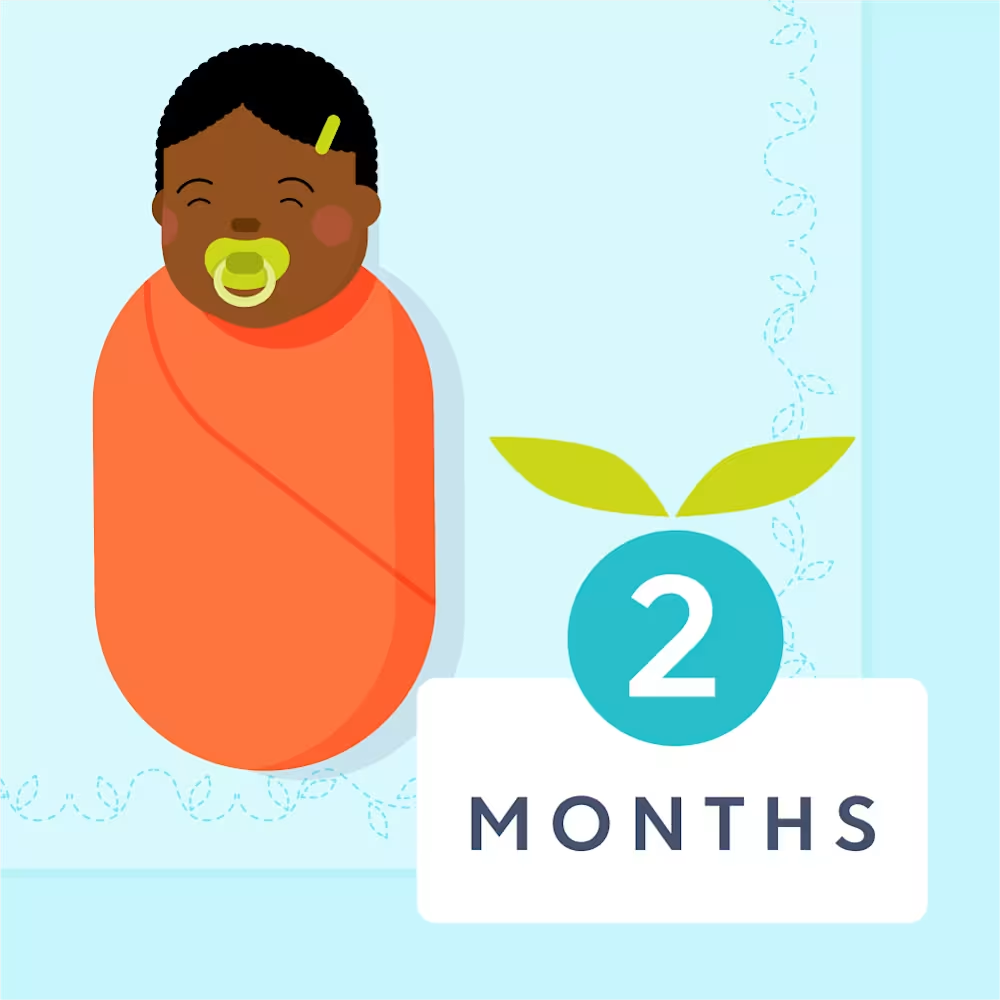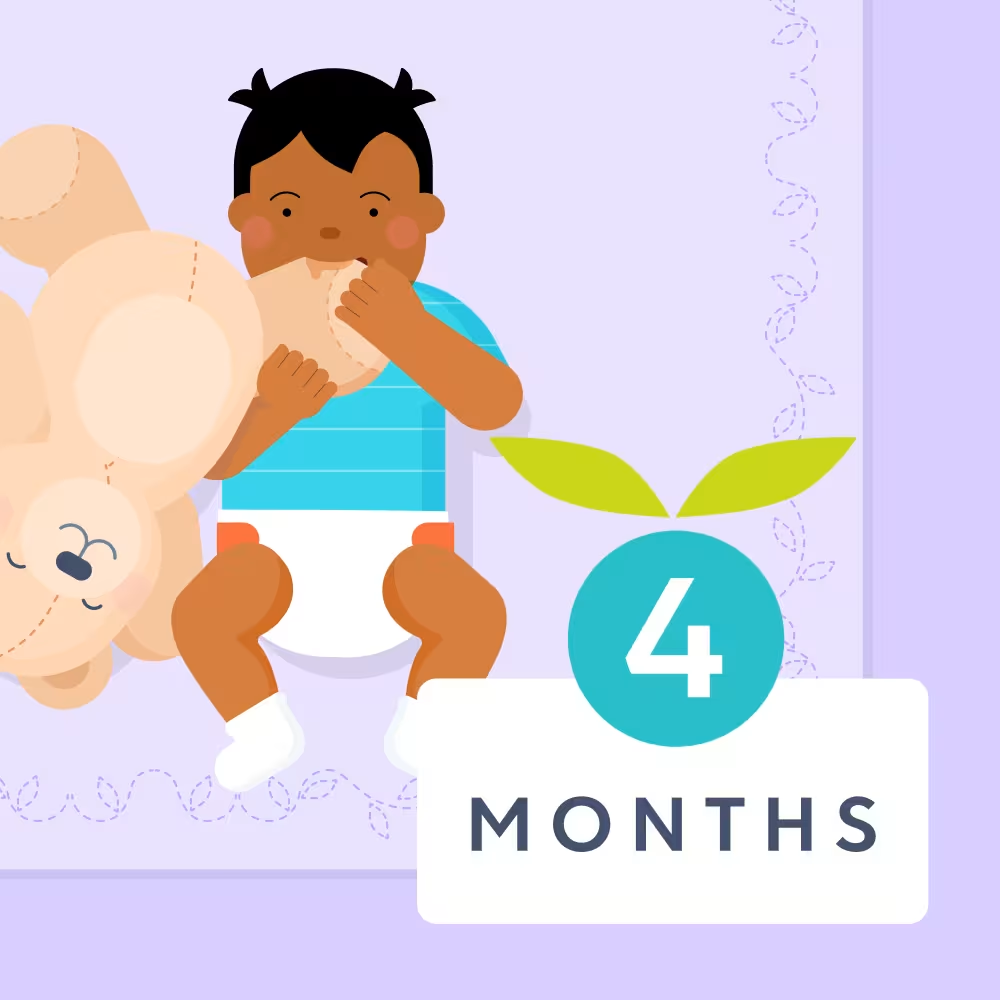3 month sleep regression: Myth or real?
Updated Dec 15, 2025

If your baby was a champion sleeper through the newborn stage and now, at around 3 months, their sleep has suddenly fallen off a cliff, you may be left scratching your head. It must be a “3 month regression,” right? Well, let’s discuss!
In this article, we’ll walk you through how sleep changes around 3 months, give you the lowdown on the so-called “3 month sleep regression,” and give you tips that can help your baby develop healthy sleep habits so they can get the rest they need.
Is there a 3 month old sleep regression?
Why is it common to feel like your 3 - 4 month old is suddenly not sleeping? Well, infant sleep patterns start to mature around this age. This change is commonly referred to as the “4 month sleep regression” but can impact sleep earlier, at around 3 months.
Here’s a little more insight: At around 3 - 4 months, a baby’s circadian rhythm [] begins to mature, which causes a change in the stages and cycles of their sleep. Instead of sleeping like newborns, they begin to experience cycles of light and deep sleep. This "sleep regression" occurs because babies may wake fully between these cycles and need assistance falling back asleep, so they call out for you. For this reason, it’s not uncommon to see more frequent night waking and shorter naps between 3 - 4 months of age.
If your 3 month old is newly experiencing more middle-of-the-night waking, short naps, and fussiness, these may be signs that a biological shift in sleep has occurred. Instead of thinking of this as a step backward, try reframing it as they’re growing and developing! (However, we understand this is easier said than done when you’re exhausted!)
Why do 3 month old babies have sleep issues?
Reason #1: Sleep patterns change at 3 - 4 months
3 month olds can have trouble falling asleep and staying asleep due to their sleep patterns maturing. They're beginning to cycle through light and deep sleep more like adults, which can lead to more frequent wakings and shorter naps
After each sleep cycle, they briefly wake up, just like older children and adults do. The difference? Babies who haven't learned to fall asleep on their own often need help getting back to sleep. If they were rocked, fed, or held to fall asleep at bedtime, they’ll likely expect the same when they wake during the night — and protest (cry) if it’s not there.
This is totally normal! Most newborns need help falling asleep, so it's common for 3 month olds to still rely on that support. (Don’t worry — we’ll offer advice on building independent sleep skills later on.)
Reason #2: Mistiming sleep can make things harder
At 3 months, sleep is naturally irregular. Most babies need about 4 – 5 hours of daytime sleep across 4 – 5 naps, but the timing and length often vary from day to day. That’s totally normal, but if naps or bedtime are mistimed, it can lead to overtiredness, short naps, or more night wakings.
Instead of sticking to a set schedule, continue watching for sleepy cues and using age-appropriate to guide when your baby sleeps. This flexible approach can help avoid missed sleep opportunities and make the day go more smoothly (for everyone).
Reason #3: Naps may be short and irregular
Short naps are normal at this age. Many 3 month olds take naps that last just 30 – 45 minutes because their daytime sleep cycles are still maturing. It’s common for babies to wake after one cycle and not yet have the ability to transition smoothly into the next without assistance.
While it can be frustrating, these short naps are developmentally appropriate. As your baby grows and begins to fall asleep more independently, naps often start to lengthen and become more predictable over time.
Reason #4: Babies may continue to wake up to feed overnight
? They tend to eat one or more times overnight. It’s normal for babies at this age to wake up overnight to feed [], whether or not they’re amid a sleep regression. You’ll want to continue feeding your child overnight until they’ve established a pattern of weight gain and have been cleared by a doctor or lactation consultant.
My 3 month old won’t nap so is this a sleep regression?
There’s a lot of variability when it comes to naps at 3 months old. We don’t expect your little one to be snoozing on a set schedule just yet, which can make trying to plan your day a bit hard. At times, it may seem like your baby won’t nap if they’re only taking short cat naps throughout the day. However, this is fairly normal at 3 months. Some babies at this age take longer naps and may only need 3 per day (though this is less common), while others take shorter naps and may need 5 in order to make it to a desirable bedtime. And this might change daily!
If your baby is still taking short naps, we wouldn’t call this a “sleep regression.” However, if this is a fun new development, this sudden change could be called a regression.
If you’re concerned about how much your baby is (or isn’t!) sleeping, keep in mind every little one is different. In addition to total hours of sleep, paying attention to their mood and energy levels can help you gauge whether or not they’re getting enough rest.
How long do 3 month sleep problems last?
It depends on what’s causing the sleep issues. Some sleep disruptions at this age are temporary and linked to normal development — like eating at night or short naps. In those cases, things may improve on their own within a few weeks.
But if your baby is struggling to fall asleep or stay asleep because they rely on something external (like being fed, rocked, or held every time) those sleep issues may continue until they learn to fall asleep independently. That’s because the ability to link sleep cycles and self-soothe is a skill that develops over time, often with some gentle guidance and consistency from caregivers.
So while some 3-month sleep issues pass quickly, others stick around longer if the underlying habits don’t shift. The good news? With the right support, most babies can build healthy sleep foundations over the coming months.
When does it start?
The “” often begins around 3 - 4 months, when a baby’s sleep architecture starts to mature. Note that this is the only sleep regression tied to a biological alteration in how a child sleeps, instead of being tied to external contributing factors (like developmental milestones, changing sleep needs, travel, or teething).
When does it end?
While there’s no magic “cure” for a sleep regression, babies tend to sleep better when they’re following an age-appropriate schedule, are developmentally able to link their sleep cycles, and can fall asleep on their own (at least some of the time). It can be useful to practice having your little one fall asleep without assistance, though it may still take another couple of months (until 5 - 6 months) for them to master this.
6 tips to handle 3 month old sleep challenges
Find more details below:
Tip #1: Watch wake windows and sleepy cues
Babies don’t always just fall asleep when tired — there’s a sweet spot between sleepy and overtired. At 3 months, most babies do best with 60 –120 minutes of awake time before their next nap.
Look for sleepy cues like yawning or eye rubbing, but don’t rely on them alone as they can be easy to miss. If your baby’s been awake for close to two hours, it’s worth trying for a nap even if they’re not showing obvious signs. Sometimes physical sleepy cues can be fleeting and easy to miss. (You won’t get it right every single time, and that’s OK! No one does.) You can also skip the mental math and use the Huckleberry SweetSpot® sleep predictor.
Tip #2: Maintain a consistent bedtime routine
Babies often thrive on predictability, even at this age. Establishing consistent pre-bedtime and pre-nap routines can help your little one know what to expect at sleep times. While this may sound like another lofty item to add to your to-do list, routines don’t have to be complicated. For instance, a pre-nap ritual could be as simple as a diaper change and a song. You may consider a longer routine for bedtime sleep that possibly consists of a feed, bath, changing into pajamas, and then reading a story. Doing these things in the exact order every time can make the transition to sleep much easier.
Tip #3: Create an ideal sleep environment
While newborns can often fall asleep on their own in the middle of the day with music blaring and the sun shining, this is likely not the case for a curious . Blackout curtains, a machine, and keeping their sleep space cool [] can mean longer naps and fewer early morning wake ups. This is especially true when dealing with the “4 month sleep regression” when babies are often in a period of light sleep in the very early morning hours. If they see light during this period, it can signal to their body that it’s time to get up and start the day — long before you’re ready.
Tip #4: Give your 3 month old opportunities to fall asleep independently in their sleep space
Helping your baby learn to fall asleep on their own at bedtime is one of the best ways to prevent them from waking frequently overnight. If a little one can fall asleep without help (like rocking or feeding to sleep), chances are they’ll be able to use these same skills to get back to sleep when they wake briefly between sleep cycles overnight and during naps. When this happens, they sleep longer and you do too!
Remember, it’s perfectly OK to start slow and practice having your baby sleep in their crib once per day at 3 months old and then increase from there if you choose. Go at a pace that works for you and your little one.
Tip #5: Rule out hunger
Many babies at 3 months still need 1 - 3 feedings at night. On top of that, children at 3 - 4 months often go through a growth spurt [] and need to eat more during this time. If you find your little one suddenly eating more and waking more frequently in the middle of the night, consider offering more breast milk or formula during the day if possible to curb hunger at night. and cluster feeding before bedtime are also good ways to try to rule out hunger as a cause of night waking at 3 months.
Note: It’s best to consult your child’s pediatrician and/or a lactation consultant to discuss your baby’s dietary needs to ensure they get the nutrition they need.
Tip #6: Set realistic expectations
Unfortunately, there's not a magical sleep regression solution — at this age or any age. That said, many babies at 3 months still need a little help falling asleep. That’s perfectly normal and common at this age. However, if your goal is to work on getting your little one to fall asleep on their own in a crib, around 3 months you may consider trying methods like gradual withdrawal or pick-up/put-down method.
How much sleep does a 3 month old need?
At 3 months old, most babies need about 15 hours of total sleep over a 24-hour period. This usually includes around 10 - 11 hours at night (broken up by feedings) and about 4 - 5 naps during the day. That said, there’s a range of what’s considered normal at this age — every baby is different, and some may need a little more or less sleep. Keep tabs on your little one’s mood and energy levels when determining if they’re getting the rest they need.
Can you sleep train during a regression?
In general, at 3 - 4 months old can vary quite a bit. If you decide to begin at this stage, think of it as giving your baby a chance to practice falling asleep independently, though they may not fully master it just yet.
Sleep training at this age can help lay the groundwork for healthy sleep habits even when they’re experiencing a sleep regression, but it’s not a quick fix. Progress may be slow or inconsistent, and even if your baby starts self-soothing at bedtime, they’ll likely still need some support during overnight wake-ups. It’s common for babies at this age to learn how to fall asleep on their own at bedtime but still need help getting back to sleep — especially during the last third of the night, when sleep is lighter and more fragmented.
According to the American Academy of Pediatrics (AAP) [1], it’s a good idea to place your baby in their sleep space while they’re drowsy but still awake at 4 months. This helps them start learning how to self-soothe, which can benefit both your baby and your sleep — fewer night wakings [2] often mean more restful nights for the whole family. This is an early, gentle version of sleep training.
Can I let my 3 month old cry it out during a sleep regression?
Since steady progress isn’t typically expected for babies at 3 months, we generally don’t recommend using the (CIO) sleep training method. If a caregiver does choose to try this approach, we strongly suggest close monitoring — using a video monitor and conducting regular safety checks at least once every hour to ensure the baby’s well-being.
What are self-care tips for tired parents?
Fuel your body (not just with caffeine): Try getting in quick, balanced snacks when you can to help lift your energy levels and mood. Think nuts, yogurt, fruit, or toast with peanut butter. The coffee IV sounds good in theory, but food will keep you going!
Lean on your support system: It’s not always easy to ask for help! However, connecting with a friend or family member — or even having someone run an errand for you or hold the baby for a bit — can give you a much-needed break.
Give yourself a pep talk: You’re doing an incredible job in a very hard season. Talk to yourself like you would a friend. Remember, perfection isn’t the goal — it’s OK to “lower the bar” and celebrate the small wins. The laundry will still be there.
Should I let my baby sleep in my bed during a regression?
The AAP [] strongly cautions against sharing a bed with your baby. If you bring them into bed for snuggles or a feed, they recommend puttingt them on their back in their own sleep space (often a crib or bassinet) before you go to bed. Avoid falling asleep with your infant in other places too — like a couch or recliner — as the risk of infant death is significantly higher [] when babies sleep with someone on one of these surfaces.
How can I tell if it's separation anxiety or 3 month sleep problems?
Many factors can contribute to a sleep challenges, including separation anxiety, so it's not necessarily sleep problems OR separation anxiety. At 3 months, your baby may be in an , called stranger anxiety, though it’s most common around 5 months. This is when babies begin to recognize the difference between their main caregivers and other adults.
Stranger anxiety at this age may contribute to sleep issues — like if your little one is extra fussy at bedtime if someone else is putting them down. They may also take shorter naps or wake more overnight. However, as discussed earlier in this article, there are plenty of other things that may also contribute to these sleep troubles at 3 months. Unfortunately, there's no easy way to pinpoint the exact cause of bumpy sleep at this age so it's best to focus on supporting your baby through it with consistent routines, plenty of comfort, and realistic expectations.
When to talk to a doctor
Sleep regressions are a normal part of child development. It’s normal for sleep to ebb and flow as your little one grows. That said, if you notice anything that may be a red flag when it comes to your child’s sleep, it's best to bring it up with their healthcare provider to rule out any potential concerns.
Takeaway
Around 3 - 4 months, a baby’s sleep architecture [] matures, leading to noticeable changes in how they sleep. Rather than sleeping like a newborn, they begin to cycle through lighter and deeper stages of sleep. This shift is often referred to as a “sleep regression” because babies may fully wake between sleep cycles and call out for help to get back to sleep.
This biological alteration occurs in all babies, but not all will experience bumpy sleep when it happens. That said, it’s not uncommon to experience increased night waking and shorter naps betewen 3 - 4 months.
Some ways to help your baby during this phase include ensuring they’re following an age-appropriate sleep schedule by watching sleepy cues and wake windows, setting up an ideal sleep environment, and practice letting your baby fall asleep on their own in their sleep space.
Share article:
Note: The content on this site is for informational purposes only and should not replace medical advice from your doctor, pediatrician, or medical professional. If you have questions or concerns, you should contact a medical professional.
6 Sources
Share article:





